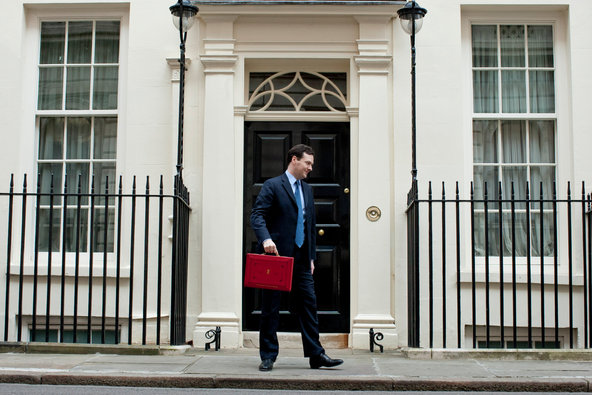 Matt Dunham/Associated PressGeorge Osborne, Britain’s chancellor of the Exchequer.
Matt Dunham/Associated PressGeorge Osborne, Britain’s chancellor of the Exchequer.
LONDON — The British government is taking aim at an unlikely target in the latest rate-rigging case: the British government.
The $612 million settlement that the Royal Bank of Scotland reached with authorities on Wednesday over rate manipulation will leave British taxpayers liable for part of the fine.
The government still owns a 82 percent stake in the bank, which was bailed out in 2008 during the height of the financial crisis.
The British government finds itself on the other side of its case as well because the Financial Services Authority, the country’s main financial regulator, has been part of the global investigation into the manipulation of benchmark rates like the London interbank offered rate, or Libor.
The case against the Royal Bank of Scotland has been politically charged after British politicians demanded that bankers’ bonuses should be used to pay for the settlement.
“There is a legitimate concern that British taxpayers, who already have bailed out the bank, will be asked to pay for past mistakes at R.B.S.,” said Pat McFadden, a British politician who is a member of the opposition party and part of the Parliament’s Treasury select committee that oversees the country’s finance industry. On Monday, George Osborne, the chancellor of the Exchequer, also called on the bank to use bonuses to pay the Libor fine.
To help pay for the global settlement, the British bank said it would claw back past and present bonuses totaling $471 million from both the traders implicated in the rate-rigging scandal as well as from employees in the bank’s operations, particularly its investment banking unit, which have not been part of the wrongdoing.
Bank officials said the clawbacks were related to the reputational damage caused to the bank, and would also cover potential future legal liabilities. But that money will be used primarily to pay the fines levied against the bank by the United States authorities.
The Financial Services Authority’s share of the fine is expected not to come from the bonuses. The money will, in a sense, be recycled since it will go to the British government’s coffers.
One of the casualties of the Libor scandal was John Hourican, head of the firm’s investment banking division, who resigned on Wednesday. He will forgo past and present compensation worth a combined $14.1 million. Mr. Hourican, who took over the investment banking unit in 2008 and has not been implicated in the wrongdoing, will receive a one-time payout from the bank of around $1 million.
Libor Explained
“This has been a soap opera for the last four years because of the ups and downs of this job,” the bank’s chairman, Philip Hampton, told reporters on Wednesday. “The bank was in a hell of a mess.”
The taxpayer stake in the bank sets the latest deal apart from the other two big Libor settlements. Last summer, the British bank Barclays agreed to pay $450 million to settle accusations that it reported false rates. In December, the Swiss giant UBS struck a sweeping $1.5 billion deal with authorities in which its Japanese subsidiary pleaded guilty to felony wire fraud.
But despite the vested interest of taxpayers, the Financial Services Authority did not take the government’s ownership stake into consideration when reaching the settlement, according to a person with direct knowledge of the matter who spoke on the condition of anonymity.
The renewed scrutiny on the bank, however, could hinder the government’s ability to sell its stake for a profit, as private investors remain wary of the bank’s future liabilities. Since the bailout in 2008, the bank’s shares have plummeted, and are currently trading around 32 percent below the initial purchase price.
As part of plans to sell the government’s stake in the bank, Vince Cable, the British business secretary, said Royal Bank of Scotland should have been fully nationalized when it was bailed out in 2008. In a speech on Wednesday, he added that one option could be to return shares in the bank to British taxpayers.
“The early hope of reprivatization now looks a very long way off, unless at an unacceptable loss,” Mr. Cable said.
Government officials have held preliminary discussions with a number of investors about selling stakes in the Royal Bank of Scotland, according to a person with direct knowledge of the matter who spoke on the condition of anonymity.
The potential losses facing British taxpayers contrast with the $182 billion bailout of the American International Group in 2008. Over the last two years, A.I.G. issued a series of stock offerings to reduce the United States government’s ownership, generating profit of around $22 billion for American taxpayers.
Article source: http://dealbook.nytimes.com/2013/02/06/the-politics-of-the-r-b-s-settlement/?partner=rss&emc=rss